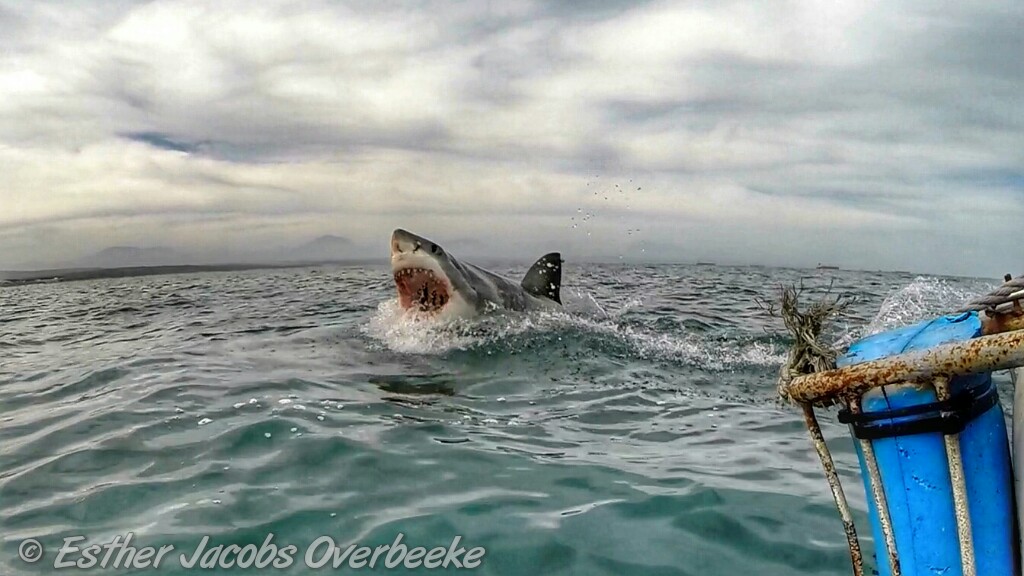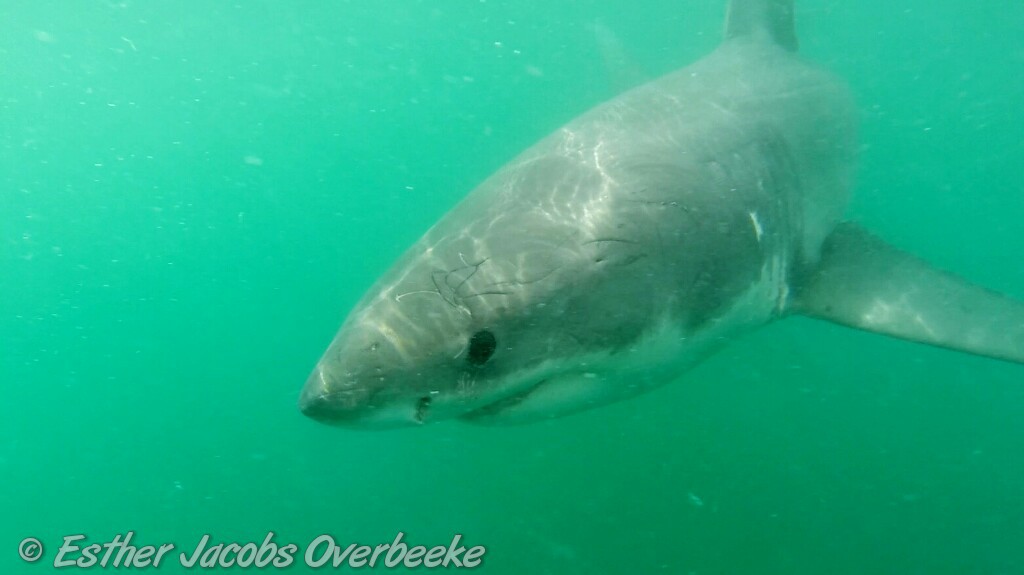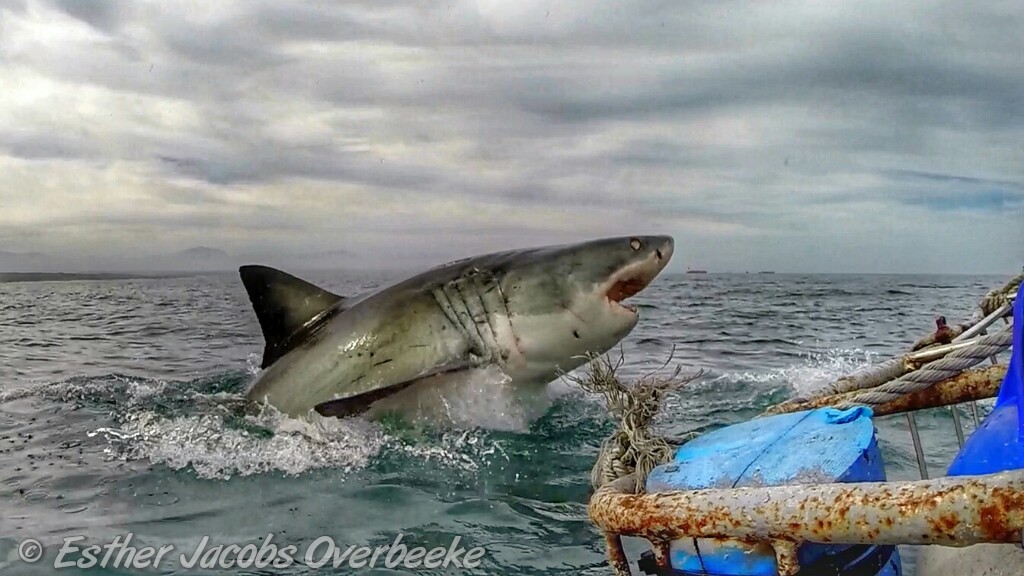Marine Life & Conservation Blogs
Sharks… we need them

Sharks have been dealt a poor hand. They are demonised by the media and film industry because that’s what sells papers and movies. It doesn’t help that most species aren’t particularly cute (case and point: the false catshark, Pseudotriakis microdon caught in Scottish waters in October 2015) so we can’t humanise them like we do with dolphins and other charming marine animals. However, sharks are absolutely vital for the health of our oceans, and in turn, the future of our planet.
Overfishing, finning, shark fishing tournaments, bycatch and longlining are all massively reducing our shark populations. Fishing practices like those encouraged by SSACN, pole and line fishing, should be the only methods used. Trawling is very destructive and unselective as the nets haul every life encountered. With longlining, boats spool out hundreds of feet of fishing line with up to 2,000 baited hooks spread along its length. With both these methods, a vast number of marine species, known as ‘bycatch’ are caught and thrown overboard dead or dying, including those listed as vulnerable, threatened or endangered. It was recently reported that thousands of spurdog are discarded into the sea dead annually in the UK. They get caught and crushed in the nets by trawlers pulling up massive catches from the depths. Bycatch amounts to up to 90% of a trawl’s haul and many of these are sharks due to their predatory nature. Global catches have increased by 300%, but much is unreported & unregulated so this figure is likely to be a lot higher. It would be great to see Scotland and the UK set an example with a drastic overhaul of fishing methods and quotas to ensure a sustainable future for UK seas.
Education among the angling community is also crucial and organisations like SSACN are not only valuable resources for information, but are proactive in encouraging best practices for sustainable fishing. With a recent report showing horrifying pictures of 40 dead cat sharks discarded on Chesil beach, by suspected anglers, angling conservation organisations need as much support as they can get to continue their positive messages to change these practices.
The most recent and accurate report states that up to 273 million sharks are killed each year. Sharks just cannot reproduce quickly enough to keep up with the demand and the only way to stop shark extinction is to stop the trades.
To envisage the vital role sharks play in our oceans, think about a fish tank and what needs to happen if one of the fish in that tank contracts a disease. You need to remove that fish from the tank before the disease spreads. Sharks prey on the diseased, the mutated, the injured and the weak, keeping the balance of our ocean’s ecosystem in check.
Sharks are at the top of the ocean food chain and their prey includes species that eat vegetation where the majority of the ocean’s carbon is stored, within seagrass, saltmarsh and mangrove. These blue carbon ecosystems, as they are called, capture and store carbon 40 times faster than rainforests and can store the carbon for thousands of years. Removing sharks from this ecosystem allows these vegetation eaters number’s to increase and results in a release of these ancient carbons and means that less carbon can be stored.
The oceans produce more oxygen than all the rainforests combined, provide a third of the world with food, remove half of the atmosphere’s greenhouse gases, and control our planet’s temperature and weather. Sharks and the oceans desperately need our help.
For individuals, other than ensuring best practice is used when fishing, there are easy ways to help save sharks:
- Never buy make-up or health goods containing shark liver oil, known as squalene
- Never buy products made of shagreen or shark leather
- Never buy fresh shark teeth or jaws
- Always ask what type of fish is being used for your fish and chips as restaurants / takeaways sometimes use shark a.k.a. rock salmon, rock eel, flake, huss or white fish
- Never eat shark fin soup or support a restaurant that sells it
As a Scot living in South Africa working in shark conservation, I have a lot of work to do to change public misconception and fishing practices used here. I recently started a campaign called Keep Fin Alive featuring Fin, a hand-puppet shark on a mission to be photographed with as many people as possible holding a sign that says “I hugged a shark and I liked it… Keep Fin Alive”. He’s already been photographed with well-known actors, singers, chefs, photographers and scientists, including John Hannah, Adam Handling and Jamie Scott. The ultimate goal of the campaign is to take a light-hearted approach to help change the common misconception of sharks and drive more attention to the issues facing sharks.
Esther Jacobs Overbeeke
Shark Conservationist
Founder: Keep Fin Alive
Blogs
Saba’s Plan for a Coral Comeback

Saba has an exciting new initiative to restore its coral reefs. This new project, running from 2024 to 2026, will focus on reviving key species in the island’s underwater ecosystems. With a collaborative team from the Saba Conservation Foundation (SCF) and Van Hall Larenstein (VHL) University of Applied Sciences, the project aims to restore both corals as well as sea urchins.
This initiative is centered around coral restoration, specifically reviving two essential coral species—staghorn coral (Acropora cervicornis) and elkhorn coral (Acropora palmata). By mapping parent colonies and using a technique known as coral gardening, SCF will create and maintain coral nurseries. These corals will eventually be outplanted at key reef sites around Saba to not only expand the number of coral colonies, but also provide essential fish habitat. The project focusses on installing coral nurseries, training staff with the newest techniques and starting with the restoration of key reef sites.

Reef Cleaners to the Rescue
It’s not just corals getting a makeover—this project also shines a spotlight on the essential role of grazers, particularly sea urchins. VHL is leading the charge on cultivating and restocking two key sea urchin species, West Indian sea egg (Tripneustes) and long-spined sea urchin (Diadema), known for their ability to keep algae in check. By removing algae, which are important competitors of corals, they help the coral to thrive. By restoring these “reef cleaners,” Saba’s project will give corals the breathing room they need to grow, setting the stage for a healthier, more balanced marine ecosystem.
From Tiny Urchins to Big Goals
The project will be funded as part of the Dutch Government’s Nature and Environment Policy Plan (NEPP) 2020-2030 for the Caribbean Netherlands, a comprehensive initiative aimed at conserving and restoring the unique natural environments of the Dutch Caribbean islands, including Saba, St. Eustatius, and Bonaire. This project is aiming for big milestones: build and maintaining coral nurseries, the expansion of urchin cultivation facilities, and the creation of a dedicated research center. By 2026, the project hopes to ramp up coral and grazer restoration, with the ultimate goal of extending these efforts across the Dutch Caribbean. By linking local initiatives to broader regional goals, Saba’s restoration project promises to leave a lasting impact on both the environment and the community.
Find out more about the DCNA at dcnanature.org.
Blogs
Reef-World marks two decades of marine conservation: strengthening impact amid coral reef threats

Empowering ocean stakeholders to tackle future challenges and ensure the survival of coral reefs and humanity
2024 marks the 20th Anniversary of The Reef-World Foundation’s tireless efforts for global coral reef conservation. The UK charity is the international coordinator of the UN Environment Programme’s Green Fins initiative, known as the leading voice in sustainable marine tourism. Today, Reef-World released its 2023-2024 Impact Report outlining a year of substantive growth and impact in its marine conservation programmes.

Impact Report Highlights:
- Impressive improvements in environmental behaviours to protect coral reefs by the marine tourism industry as the global participation of Green Fins increases.
- Continued capacity building for government and NGO staff to effectively manage marine tourism activities in Asia, Caribbean and Red Sea regions.
- For the first time in Green Fins’ 20-year history, tourism operators have achieved ‘Best Environmental Performer’ status by demonstrating the lowest possible environmental impact in their environmental assessments. In 2024, three dive operators achieved this challenging milestone.
- Significant increases in global participation of Reef-World’s innovative digital conservation tools.
- 138 Green Fins dive operator members achieved the strict threshold for PADI Eco Center recognition.
- Developed four new educational materials and translated two into 16 languages to support the marine tourism industry in achieving sustainability targets.
- Establishing a new Reef-World Development strategy and recruiting new roles – Development and Programmes Managers.
- Reef-World’s board welcomes new Chair and Trustees strengthening organisational leadership.

Reef-World started as a one-person mission to inspire and empower communities to act in conserving and sustainably developing coral reefs and related ecosystems. Today, the team of 12 continues to meet this mission by inspiring and empowering the global marine tourism community to be exemplary sustainability leaders by using the Green Fins guidelines and tools to simultaneously use and protect the world’s precious reefs.
In April 2024, the fourth global coral reef bleaching event was confirmed. Reef-World’s work has never been more urgent as the marine environment, and the benefits they provide humanity, continue to be eroded by global threats. The reduction of local threats, like those from the marine tourism industry, is an essential step to ensuring a future where coral reefs survive and continue to support the millions of people who depend on their ecosystem benefits. Reef-World’s work buys time for coral reefs and related ecosystems to be resilient to the impacts of global threats.
“Right now our corals are facing the greatest fight of their existence as the terrifying predictions of the steps towards their complete extinction are starting to come true. But all is not lost, reefs are resilient and they have existed on this planet for millions of years. We must take action now, to buy time for reefs by reducing threats facing them and allowing them to react and adjust to the changing environment they need to survive in.” – Chloe Harvey, Executive Director
Looking Forwards:
Like coral reefs, the Reef-World team needs to be resilient in the face of the complex challenges of the conservation sector. Reef-World has invested significantly in developing a Culture of Care to ensure the well-being of its team on a daily basis, continuing to be an exemplary employer to enable its team to best achieve the mission for coral reef conservation.
With the foundations of a Culture of Care and organisational development laid, Reef-World is emerging from the end of a natural organisation life cycle, that brings the challenges of growth and scale, stronger than ever. With a new strategy in place to generate much needed resources, Reef-World is excited for the opportunities to leap forward, continue to scale our impact and lean into new innovations and untapped opportunities for marine conservation.
We continually strive to become a forward-thinking organisation that delivers on our goals and commitments to our stakeholders with fresh approaches and not being afraid of steering away from a “normal approach.” This approach is not only applied to our programmes of work but also internally and carries over to our Culture of Care for our team.” — JJ Harvey, Operations Director

The Reef-World Foundation is immensely grateful for the continued support of its grant funders: UN Environment Programme, IUCN’s Blue Natural Capital Financing Facility, Adventure Travel Conservation Fund, PADI Aware Foundation, and World Nomads Footprints Program.
Reef-World would also like to express its gratitude to international partners whose vital support has resulted in significant tangible benefits for our work and mission: PADI; Professional SCUBA Schools International (PSS); Explorer Ventures; 1% for the Planet; ZuBlu; Snorkel Venture, GSTC; Dive O’Clock; Seven Dragons; DiveAssure and Eco Beach, without whom these achievements would not be possible.
The full 2023–2024 Annual Impact Report is available on Reef-World’s website.
-

 News2 months ago
News2 months agoIconic SS United States to become the World’s Largest Artificial Reef
-

 News3 months ago
News3 months agoBook Review – 52 Assignments: Underwater Photography
-

 Gear News3 months ago
Gear News3 months agoDYNAMICNORD – New German diving brand enters the British market
-

 News3 months ago
News3 months agoExploring Cenote El Pit: A Diver’s Dream
-

 Gear News3 months ago
Gear News3 months agoTry BARE drysuits (and maybe even win one!) this Friday with Sea & Sea at North West Dive Fest
-

 Marine Life & Conservation3 months ago
Marine Life & Conservation3 months agoBook Review: Coral Triangle Cameos
-

 Blogs2 months ago
Blogs2 months agoDive the Egyptian Red Sea this Autumn with Regaldive
-

 News3 months ago
News3 months ago2024 Ocean Art Underwater Photo Competition Announced

















